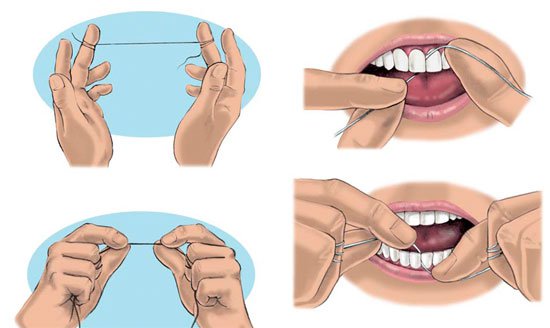Every six months, you visit the dentist for a cleaning — and likely a lecture about the importance of flossing. But if you’re like many dental patients, the advice travels in one ear and out the other — much like, well, dental floss gliding between the spaces of your teeth.
But flossing does about 40% of the work required to remove sticky bacteria, or plaque, from your teeth. Plaque generates acid, which can cause cavities, irritate the gums, and lead to gum disease. Each tooth has five surfaces. If you don’t floss, you are leaving at least two of the surfaces unclean. Floss is the only thing that can really get into that space between the teeth and remove bacteria.
Here are the top five reasons to floss your teeth regularly:
- Flossing is the most effective way to remove plaque buildup from in between your teeth. Plaque is a sticky substance that is full of bacteria, which if left uncleaned can lead to cavities, gum disease, and bone loss around your teeth. All of these conditions, if allowed to progress, can lead to the loss of a tooth
- Flossing also removes food particles from between your teeth. Removing these, combined with removing plaque, can lead to fresher breath.
- Gum disease is hard to diagnose if you are not trained on what to look for. Some of the signs are bleeding gums and gum recession. Flossing regularly can help prevent both these conditions.
- People suffering from heart disease or who have had heart surgery must be very vigilant with their oral hygiene. The mouth is a gateway to harmful bacteria that may reach cardiac tissue and cause a condition called endocarditis. Moreover, if you suffer from heart disease, by keeping your mouth and teeth clean, you can reduce the risk of complications. Several current scientific studies has demostrated a link between gum disease and heart disease.
- Diabetic patients are more likely to develop gum disease, which in turn can increase blood sugar and diabetic complications. People with diabetes are more likely to have gum disease than people without diabetes, probably because people with diabetes are more susceptible to contracting infections.
And here is a bonus reason: People who floss regularly are less likely to get the usual “importance of flossing” lecture from the hygienist at their recall visit!

Standard flossing technique
For more information about gum disease and your health, visit https://www.perio.org/consumer/gum-disease.htm

